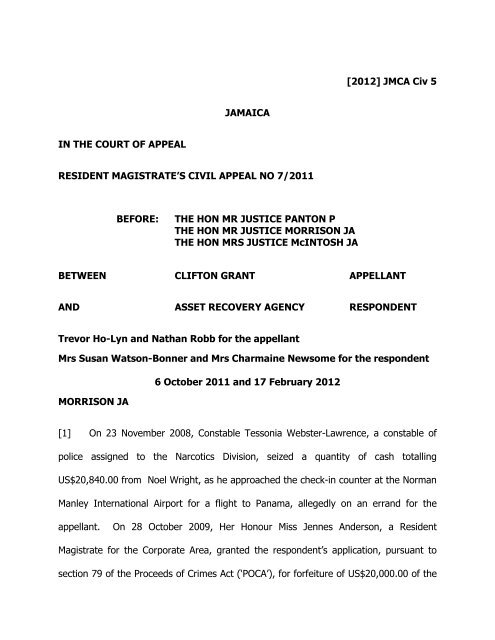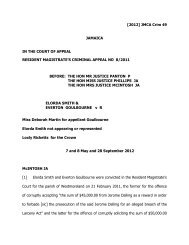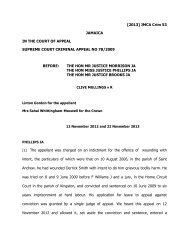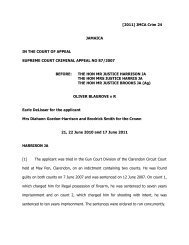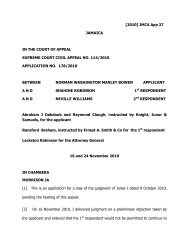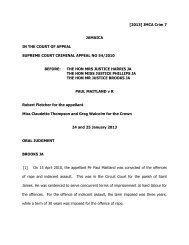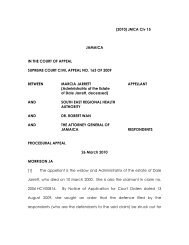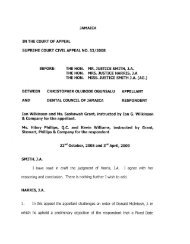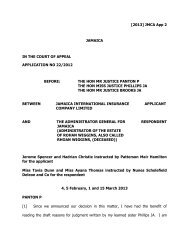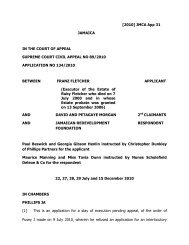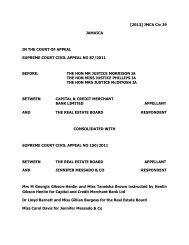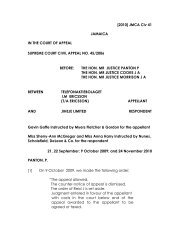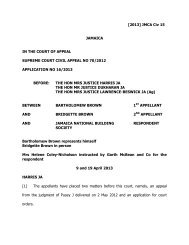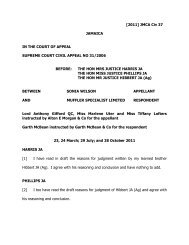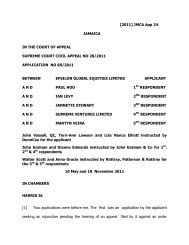Grant (Clifton) v Asset Recovery Agency.pdf - The Court of Appeal
Grant (Clifton) v Asset Recovery Agency.pdf - The Court of Appeal
Grant (Clifton) v Asset Recovery Agency.pdf - The Court of Appeal
Create successful ePaper yourself
Turn your PDF publications into a flip-book with our unique Google optimized e-Paper software.
about how the matter was dealt with when it actually came on for hearing before theResident Magistrate.[7] <strong>The</strong> application for forfeiture against the appellant was supported by affidavitssworn to on 25 June 2009 by Constable Webster-Lawrence and Desmond Robinson, aforensic examiner attached to the Financial Crimes Investigation Unit within theFinancial Investigations Division (formerly the Revenue Protection Division).At thehearing before the learned Resident Magistrate, the appellant relied on an affidavitsworn to by him on 27 October 2009 and filed on his behalf by his attorneys-at-law.[8] When the matter came on for hearing on the following day, 28 October 2009,both the appellant and the respondent were represented by counsel. At the outset <strong>of</strong>the hearing, counsel who then appeared for the appellant proposed to the court thatthe matter should proceed on the basis <strong>of</strong> the affidavit evidence alone. This proposal,which was embraced by counsel for the respondent, was then endorsed by the court.<strong>The</strong> matter commenced and in due course both counsel addressed the court in detail onthe facts as well as the law, after which the court ruled that the respondent had madegood the application for forfeiture pursuant to section 79 <strong>of</strong> POCA and granted theorder accordingly.In her written reasons for her ruling, the learned ResidentMagistrate observed that, “[o]n a balance <strong>of</strong> probability between Mr. Robinson’sAffidavit and Mr. <strong>Grant</strong>’s; the <strong>Court</strong> is <strong>of</strong> the opinion that the cash ought to beforfeited”.[9] <strong>The</strong> appellant appealed from this ruling by notice dated and filed on 9 November2009, on grounds which are no longer relevant. When the matter came on for hearing
[11] It became immediately clear to us that, as ground one was potentially dispositive<strong>of</strong> the appeal, it might be helpful to hear Mrs Susan Watson-Bonner, who appeared forthe respondent before us, as she had in the court below, on whether the matter was, inlaw and in fact, covered by the authority <strong>of</strong> Metalee Thomas, as Mr Ho-Lyncontended.Mrs Watson-Bonner quite properly accepted that, in the light <strong>of</strong> thatdecision, the hearing <strong>of</strong> a section 79 application is now required to be conducted inopen court on the basis <strong>of</strong> oral evidence.However, she sought to distinguish theinstant case, on the basis that the appellant had been represented by counsel (andcould therefore have been heard had he wished to be) and that in any event, it havingbeen at the request <strong>of</strong> the appellant’s counsel that the matter had proceeded as it had,the appellant should not now be allowed to raise a procedural objection to the conduct<strong>of</strong> the trial.[12] One cannot help but be sympathetic to Mrs Watson-Bonner’s position. <strong>The</strong>appellant was, after all, represented in the court below by experienced counsel, whosedecision to suggest that the matter proceed on affidavit evidence was obviously aconsidered one at the time. It is in these circumstances perhaps hardly surprising thatit was decided to relieve that counsel <strong>of</strong> any inhibition or embarrassment before thiscourt by instructing Mr Ho-Lyn to take this point on appeal.[13] That having been said, however, it appears to us that Mr Ho-Lyn’s submission,that the learned Resident Magistrate had no legal basis upon which to determine thismatter on affidavit evidence, must be correct. Resident Magistrates’ <strong>Court</strong>s are, asHarrison JA emphasised (at para. [34]) in Metalee Thomas, purely creatures <strong>of</strong>
statute and as such enjoy no inherent jurisdiction and may only “exercise such powersas are given to them by statute, and…in accordance with the procedures laid down inthe statute and not otherwise”.[14] In addition to section 183 <strong>of</strong> the RM Act, which provides that at the hearing <strong>of</strong>any civil or criminal proceeding “all persons adduced as witnesses may be examinedupon oath, or…on solemn affirmation”, there is Order XVI rule 3 <strong>of</strong> the RM <strong>Court</strong> Rules,which states as follows:“Except where otherwise provided by these rules, theevidence <strong>of</strong> witnesses on the trial <strong>of</strong> any action or hearing <strong>of</strong>any matter shall be taken orally on oath; and where bythese rules evidence is required or permitted to be taken byaffidavit such evidence shall nevertheless be taken orally onoath if the <strong>Court</strong>, on any application before or at the trial orhearing, so directs.”[15] In the absence <strong>of</strong> any provision in the RM <strong>Court</strong> Rules for the taking <strong>of</strong> evidenceon affidavit in these circumstances, or <strong>of</strong> any later rules made under POCA providing forthe taking <strong>of</strong> evidence on affidavit in section 79 proceedings, it appears to us to bebeyond debate that the procedure adopted by the Resident Magistrate in the instantcase, albeit with the consent <strong>of</strong> the parties, was not sanctioned by law and cannottherefore be allowed to stand.[16] In the result, it was not necessary to consider the appellant’s grounds two andthree.We would however observe that, in any case in which a judicial <strong>of</strong>ficer isrequired to decide between differing versions <strong>of</strong> the same events, it will inevitably be amatter <strong>of</strong> considerable difficulty for an appellate court to assess the correctness or
otherwise <strong>of</strong> the conclusion reached in the court below without the benefit <strong>of</strong> someform <strong>of</strong> analytical reasoning, no matter how brief.[17] <strong>The</strong>se are the reasons for the decision <strong>of</strong> the court, as set out in para. [2]above.


